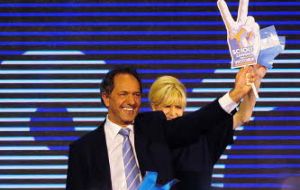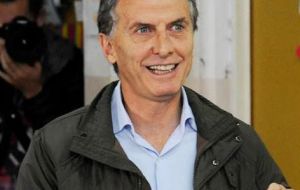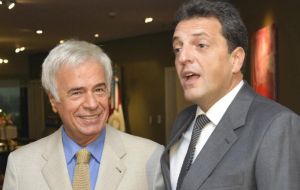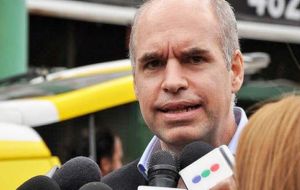MercoPress. South Atlantic News Agency
Argentine primaries added more expectations to October 25 first round vote
 Daniel Scioli, according to the first results and tendencies, and despite celebrations did not reach the 40% floor targeted
Daniel Scioli, according to the first results and tendencies, and despite celebrations did not reach the 40% floor targeted  Macri's presidential coalition did very well with its 32% showing, but still needs more alliances to have a clear chance
Macri's presidential coalition did very well with its 32% showing, but still needs more alliances to have a clear chance  Massa (R) and his UNA can tip the balance, but his coalition has basically two strong personalities: himself and Juan Manuel de la Sota (L), strongman of Cordoba
Massa (R) and his UNA can tip the balance, but his coalition has basically two strong personalities: himself and Juan Manuel de la Sota (L), strongman of Cordoba  The Rodriguez Larreta syndrome in July's election of Macri's successor in Buenos Aires City, is ever so present
The Rodriguez Larreta syndrome in July's election of Macri's successor in Buenos Aires City, is ever so present The Cristina Fernandez administration candidate Daniel Scioli, as anticipated, was the presidential hopeful with most votes in Argentina Sunday's open, simultaneous and mandatory primaries, (PASO), in which the different parties chose those who will lead them into the 25 October election to elect the head of the Executive, half the Lower House and a third of the Senate.
At 01:00 Monday morning the current governor of the Buenos Aires province was supported by 36.96% of ballots cast while, as forecasted his runner up was Mauricio Macri, former two times mayor of Buenos Aires City whose coalition captured 31.21% of the vote, and a third grouping, UNA, headed by Sergio Massa, almost 22%.
Likewise in the province of Buenos Aires, the most important electoral district of Argentina with 35% of registered voters, the primaries showed a similar score, the candidate from the ruling Victory Front coalition of Cristina Fernandez, Anibal Fernandez managed 38.6% of the vote; Macri's, Maria Eugenia Vidal, 32% and the UNA hopeful, Felipe Solá, 19.4%.
Vote counting and results were slow in coming in because of dreadful weather, with rain and wind almost the whole day in most of the Argentine territory, plus flashfloods in some provinces, which made communications difficult.
A normal turnout to vote of over 82%, as is 2011, was estimated to be down to 70% on this occasion.
However the tendencies are clear and despite the majority vote of the Victory Front for presidential candidate Scioli and Fernandez in the Buenos Aires province, the results are less encouraging than expected for Cristina Fernandez and her K model, and in the months leading to October will become a serious challenge, that could derail original plans.
In effect, under Argentine law to take the presidency the winning candidate needs 45% of ballots cast or 40% plus ten points difference over the runner up; if not a run off takes place a month later. Sunday's results indicate that Scioli has neither, and to make things more complicated, his runner up Macri and UNA's Massa together could knock him out, if they reach an agreement or if in the case of second ballot scenario, voters could turn the dispute into a very close affair.
In the province of Buenos Aires, critical for a victory at national level, the leading party needed a much stronger showing, even when Anibal Fernandez and Massa (Peronist dissident) could have the sufficient support to make it a day next October, if they reach an agreement, which seems difficult given the cabinet chief's ability to make enemies with his daily briefings.
But here also, as at the Casa Rosada level, much delicate negotiations will be needed, besides ensuring that a declining economy and climbing inflation, decline and climb at a slower pace.
This scenario has a recent immediate record, which was unexpected for political strategists and pollsters. In the recent election to succeed Macri in Buenos Aires City, his undisputed leadership and support in Argentina's capital, allowed his handpicked candidate Horacio Rodriguez Larreta obtain a 45% victory in the first round with almost twenty points over his runner up (but insufficient because in Buenos Aires electoral procedure the only threshold is 50%).
However in the runoff Rodriguez Larreta just squeezed by with 51% of the vote against 48% of Martin Lousteau. Opinion polls were forecasting at least a ten-point difference.
In the first round on 5 July, Lousteau only captured 25% of ballots, and the third grouping, from the Victory Front, 21%. The Cristina Fernandez candidate, Mariano Recalde said that he would not support any of the two candidates in the runoff because they only represented the 'same neo-liberal option' and thus left his supporters to decide, while the small radical parties opted mostly to abstain or vote blank.
The Rodriguez Larreta syndrome was 51% to 48% and with an exceptional 5% of blank votes. Macri's presidential aspirations in his own house received quite a bashing and he even went on to water down his pro-business speech and promise to keep some of the current administration's social policies. Ironically they called him MaKri.
So why could this not be repeated at national and Buenos Aires province level? It seems as if the Argentine electorate is supportive of its parties but also, just under the surface, fed up with politics and non deliverance of promises. Thus the surprise events in Buenos Aires city.
In other words, Scioli and Macri will have to restructure their strategies and/or alliances to ensure the 45% or the 40% plus ten-point difference next October and if not, a runoff which could be even more difficult to grasp, given the current volatility of the electorate, closely linked to the performance and expectations of the Argentine economy.




Top Comments
Disclaimer & comment rules-

-

-

Read all commentsSomeone bang Macri and Massa's heads together please, before it's too late.
Aug 10th, 2015 - 11:37 am 0WHO GIVES A FUCK?
Aug 10th, 2015 - 12:15 pm 0A lot of people didn't vote due to the floods so anything can happen in October. Still this isn't good news for macri. I don't think an agreement with massa is a good idea because massa is a K peronist. He better get 30% or else we will get same old same old.
Aug 10th, 2015 - 12:28 pm 0Commenting for this story is now closed.
If you have a Facebook account, become a fan and comment on our Facebook Page!